Unit 5 Our School Life Topic1 Section
初中英语对话

初中英语对话篇一:初中英语情景对话Unit 5 Our School LifeTopic 1 How do you usually e to school?Ⅱ.情景交际。
(5分)根据对话的情景,从方框中选择适当的句子填在画线处,使对话完整通顺。
其中有两项是多余的。
A:Hi, Wang Li! What time do you usually get up on weekdays?B:I always get up at about six o’clock.A: How do you usually go to school?B: But sometimes I go to school by bus.A:By the way, where does your mother work?B:She works in a factory. She makes shoes.A:B:She usually goes to work by subway.A:Where does she have lunch?B: It takes her too much time to e back home for lunch.A:Oh, it’s time for class.Topic 2 He is running on the playground.Ⅱ.情景交际。
(5分)从Ⅱ栏中找出Ⅰ栏的答语。
其中有一项是多余的。
Ⅰ Ⅱ()11.Where is Jane?A.Three weeks.()12.What are they doing? B.Yes, he is.()13.Would you like to play soccer?C.She is in the lab.()14.How long can I keep it? D.Good idea!()15.Is Tom having lunch at home now? E.No, I wouldn’t.F.They are dancing.Topic 3 My school life is very interesting.Ⅱ.情景交际。
钟楼区某中学七年级英语下册 Unit 5 Our School Life Topic 1 I usu

Unit 5 Topic 1 Section CI. Teaching aims1.Knowledge aims能根据已学语音、音标及发音规则,正确朗读和拼写下列词汇:begin, at school, after, bed, basketball, swim, listen, music, library, week, once, twice在Section A和Section B的语法基础上,能熟练运用usually, often, always等频度副词和两种交通方式的表达,能用一般现在时第三人称单数表达日常活动,能对频率进行提问与回答;在Section A已学的语音基础上,能结合图片和音标拼写单词,并能尝试结合语音发音规律拼读新单词,并了解句子的重音和升降调;能结合话题,运用“谈论日常生活、询问和回答某项活动的频度”等交际功能的用法,进行口头和笔头的信息输出,如:(1)I usually get up at ... in the morning.(2)At ... o’clock I have breakfast...(3)—How often do you come to the library?—Three times a week.2.Skill aims能听懂有关表达日常生活的叙述;能听懂简单的课堂用语,并作出反应;能根据图文就交通方式和日常活动的频度等进行交流;能在阅读训练中进行读前猜测、读中验证的活动;能根据图文理解相关话题,抓住大意和具体信息并根据要求进行学习活动;能准确写出黑体单词和词组;能写出表达交通方式和频度的简单句子。
3.Emotional aims在学习过程中,结合小组竞赛、同伴互助等活动,培养互相帮助、共同进步的合作精神;采用角色扮演等灵活多样的学习方式,激发学习英语的兴趣;通过了解他人的校园生活培养关心他人的意识。
II. The key points and difficult points1.能熟练运用usually, often, always等频度副词和两种交通方式的表达,能用一般现在时的第三人称单数表达日常活动,能对频率进行提问与回答;2.培养在阅读训练中进行读前猜测、读中验证的阅读能力;3.结合话题,运用“谈论日常活动、提问频度”等进行口头和笔头的信息输出。
仁爱科普版英语七年级下Unit 5 Our school life Topic 1 I usual

仁爱版七年级英语下册Unit 5 Topic 1 Section B同步练习题I、单词拼写.1.工作日2.早的;早地3.鸟4.捉住;接住5.软体虫6.有时7.很少8.步行; 散步9.从不10.骑(自行车,马)II、短语和句子..1.在工作日2.步行去上学3.搭公交车上学4.骑自行车去上学5.坐地铁回家6.步行去公园7.看电视8.每星期天9.踢足球10.看电影11.在下午/晚上12.早起的鸟儿有虫吃.13.你通常在工作日几点起床?14.我很少步行去上学.15.他们总是乘公交车去动物园.III.分别用介词和动词写短语.乘公交by bus , take a bus1.骑自行车,2.乘火车,3.步行,4.乘飞机,5.乘地铁,6.乘轮船,7.乘小船,IV.用括号中词的适当形式填空.1. She always (get) up at about six o'clock.2. The early bird (catch) the worm.3. Tom seldom (watch) TV in the evening.4. Maria sometimes (take) the subway home.5. Li Xiang often (come) to school by bike.6. What about (ride) a bike to school tomorrow?7. She always (go) to shop by train.8. Maria (not take) the bus to work on weekdays.9. How your father (go) to work every day?10. Maria with her brother (do) (she) homework in the evening.11. Lucy sometimes (walk) to school.12. I’d like (see) a movie tomorrow.13. A: his father (play) soccer at weekends ?B:Yes, he (do).14. Many (bird) are in the tree.15. She doesn't want (get) up so early.V.句型转换.I. Lucy often rides a bike to school(同义句)Lucy often .2. Jane usually comes to school on foot.(同义句)Jane usually .3. They seldom take the subway home.(同义句)/They seldom .4. We always go to the zoo by bus. (同义句)We always .5. Mr. Green never drives a car to work.(同义句)Mr. Green never .6.Michael always go shopping by bus.(对划线部分提问)Michael always .7.My mother always watches TV in the evening.(变为否定句)My mother TV in the evening,8.Maria does her homework at 6:30 every evening.(改为一般疑问句)Maria at 6:30 every evening?VI.补全对话.A: Lucy,1. ?B: I always get up at half past six.A: 2. ?B: I usually go to school on foot, but sometimes by bike. 3. ?A: I seldom walk to school, I often go to school by subway.B: 4. ?A: I often go to school with Jane.B: 5. ?A: Jane lives near my home. So we often go to school together(一起).B: Let's go to school together tomorrow.A: OK.仁爱版七年级英语下册Unit 5 Topic 1 Section B同步练习题I、单词拼写.1weekdays 2 early 3 bird 4 catch 5 worm 6 sometimes 7 seldom 8 walk 9 never 10 rideII、短语和句子.1on weekdays 2 go to school on foot 3 go to school by bus 4 go to school by bike 5 go home by underground 6 go to the park on foot 7 watch TV 8 every Sunday 9 play football 10 see a film 11 in the afternoon /evening 12The early bird catches the worm.13. When do you usually get up on the weekday?14. I seldom walk to school.15. They always take the bus to the zooIII.分别用介词和动词写短语.1 by bike ride a bike 2 by train take a train 3 on foot walk 4 by plane take a plane 5 by underground take an underground 6 by ship take a ship 7 by boat take a boatIV.用括号中词的适当形式填空.1 gets 2 catches 3 watches 4 takes 5 comes 6 riding 7 goes 8 doesn`t go 9does go 10 does her 11 walks 12 to see 13 Does play14 birds 15to getV.句型转换.1goes to school by bike 2 walks to school 3 go home by subway 4 take a bus to the zoo 5 goes to work by car 6 How does go shopping 7 doesn`t watch 8 Does do her homework VI.补全对话.1When do you get up? 2 How do you go to school 3 What about you/ 4 Who do you go to school with? 5 Why?。
仁爱英语七年级下五单元topic1 知识点
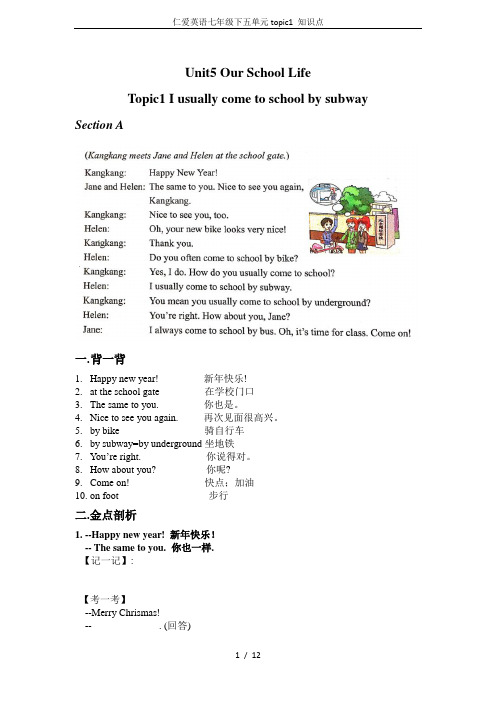
Unit5 Our School LifeTopic1 I usually come to school by subway Section A一.背一背1.Happy new year! 新年快乐!2.at the school gate 在学校门口3.The same to you. 你也是。
4.Nice to see you again. 再次见面很高兴。
5.by bike 骑自行车6.by subway=by underground坐地铁7.You’re right. 你说得对。
8.How about you? 你呢?e on! 快点;加油10.on foot 步行二.金点剖析1. --Happy new year! 新年快乐!-- The same to you. 你也一样.【记一记】:【考一考】--Merry Chrismas!-- _____________. (回答)2. Oh, your new bike looks very nice! 你的新车看起来很漂亮!【记一记】:拓展:look ____ 看look ____ 看上去像look ____ 照看【考一考】1. Ann’s mother is not at home. So Ann has to _________ her sister.2.Jim _______ his father. They both(都) have small eyes.3. Please _______ the photo! It’s wonderful.4. Your dress _____ very nice. May I have a look?A. watchB.seesC. looksD. shows3.--How do you usually come to school? 你平时怎么去上学?-- I usually come to school by subway.【记一记】:注意:① by,on, in 引导的短语在句中只能作状语,与go,come,get等连用。
七年级英语下册Unit5OurschoollifeTopic1IusuallycometoschoolbysubwaySectionB教案(新版)仁爱版
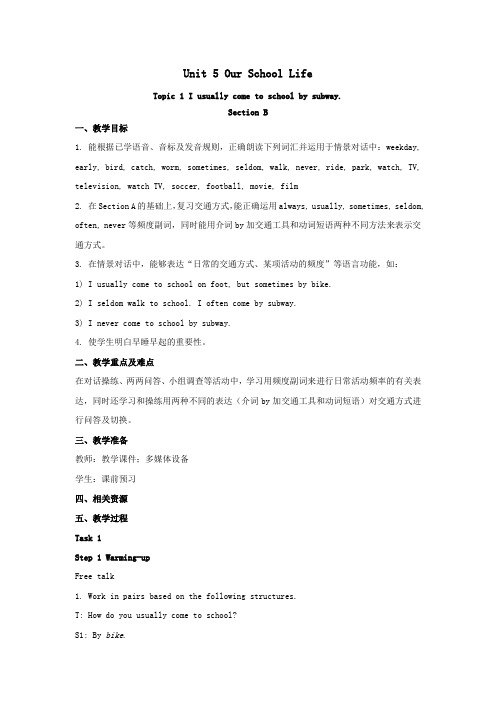
Unit 5 Our School LifeTopic 1 I usually come to school by subway.Section B一、教学目标1. 能根据已学语音、音标及发音规则,正确朗读下列词汇并运用于情景对话中:weekday, early, bird, catch, worm, sometimes, seldom, walk, never, ride, park, watch, TV, television, watch TV, soccer, football, movie, film2. 在Section A的基础上,复习交通方式,能正确运用always, usually, sometimes, seldom, often, never等频度副词,同时能用介词by加交通工具和动词短语两种不同方法来表示交通方式。
3. 在情景对话中,能够表达“日常的交通方式、某项活动的频度”等语言功能,如:1) I usually come to school on foot, but sometimes by bike.2) I seldom walk to school. I often come by subway.3) I never come to school by subway.4. 使学生明白早睡早起的重要性。
二、教学重点及难点在对话操练、两两问答、小组调查等活动中,学习用频度副词来进行日常活动频率的有关表达,同时还学习和操练用两种不同的表达(介词by加交通工具和动词短语)对交通方式进行问答及切换。
三、教学准备教师:教学课件;多媒体设备学生:课前预习四、相关资源五、教学过程Task 1Step 1 Warming-upFree talk1. Work in pairs based on the following structures.T: How do you usually come to school?S1: By bike.T: How do you usually go to the zoo?S2: By bus.2. Choose a few pairs to act them out.【设计意图】复习上节课所学知识点,培养学生口语表达能力。
Unit 5 Our School Life
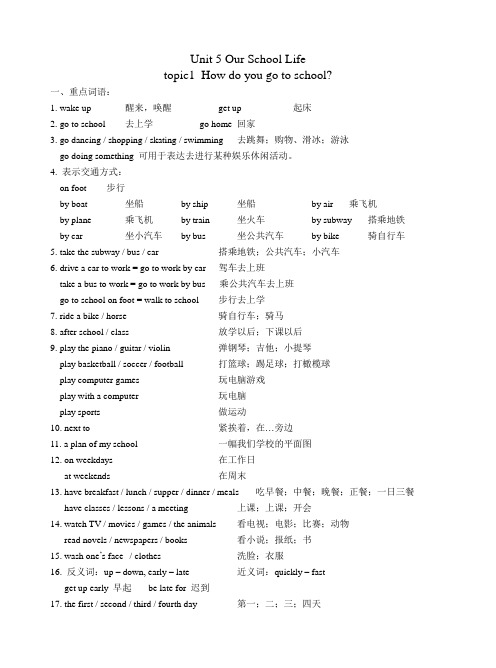
Unit 5 Our School Lifetopic1 How do you go to school?一、重点词语:1. wake up 醒来,唤醒get up 起床2. go to school去上学go home 回家3. go dancing / shopping / skating / swimming 去跳舞;购物、滑冰;游泳go doing something 可用于表达去进行某种娱乐休闲活动。
4. 表示交通方式:on foot 步行by boat 坐船by ship 坐船by air 乘飞机by plane 乘飞机by train 坐火车by subway 搭乘地铁by car 坐小汽车by bus 坐公共汽车by bike 骑自行车5. take the subway / bus / car 搭乘地铁;公共汽车;小汽车6. drive a car to work = go to work by car 驾车去上班take a bus to work = go to work by bus 乘公共汽车去上班go to school on foot = walk to school 步行去上学7. ride a bike / horse 骑自行车;骑马8. after school / class 放学以后;下课以后9. play the piano / guitar / violin 弹钢琴;吉他;小提琴play basketball / soccer / football 打篮球;踢足球;打橄榄球play computer games 玩电脑游戏play with a computer 玩电脑play sports 做运动10. next to 紧挨着,在…旁边11. a plan of my school 一幅我们学校的平面图12. on weekdays 在工作日at weekends 在周末13. have breakfast / lunch / supper / dinner / meals 吃早餐;中餐;晚餐;正餐;一日三餐have classes / lessons / a meeting 上课;上课;开会14. watch TV / movies / games / the animals 看电视;电影;比赛;动物read novels / newspapers / books 看小说;报纸;书15. wash one’s face / clothes 洗脸;衣服16. 反义词:up – down, early – late 近义词:quickly – fastget up early 早起be late for 迟到17. the first / second / third / fourth day 第一;二;三;四天18. clean the house 打扫房子19. 表示建筑物(尤其学校建筑物):on the playground 在操场at school / home / table 在学校;家里;桌旁in a computer room / teachers’ office / classroom building / gym / library / lab / canteen在电脑室;教师办公室;教学楼;体操馆;图书馆;实验室;食堂20. around six o’clock = at about six o’clock 大约在六点21. 频率副词:never, seldom, sometimes, often, usually, always二、重点句型:1. It’s time to get up. 该起床的时候了。
Howdoyouusuallycometoschool
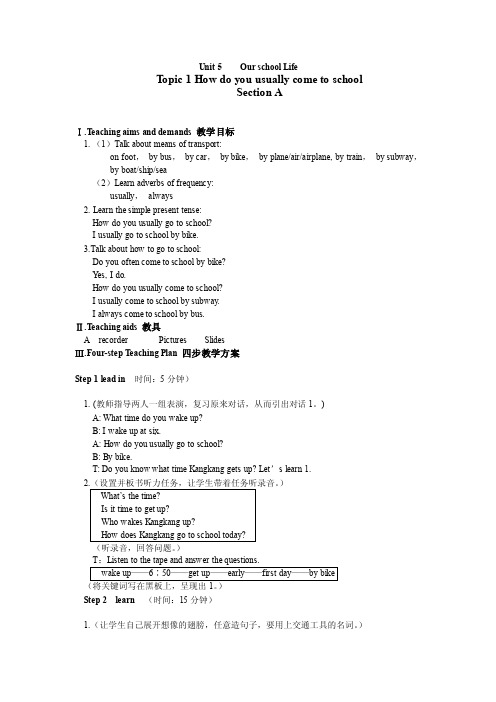
Unit 5 Our school LifeT opic 1 How do you usually come to schoolSection AⅠ.T eaching aims and demands 教学目标1. (1)Talk about means of transport:on foot,by bus,by car,by bike,by plane/air/airplane, by train,by subway,by boat/ship/sea(2)Learn adverbs of frequency:usually,always2. Learn the simple present tense:How do you usually go to school?I usually go to school by bike.3.Talk about how to go to school:Do you often come to school by bike?Y es, I do.How do you usually come to school?I usually come to school by subway.I always come to school by bus.Ⅱ.T eaching aids 教具A recorder Pictures SlidesⅢ.Four-step T eaching Plan 四步教学方案Step 1 lead in 时间:5分钟)1. (教师指导两人一组表演,复习原来对话,从而引出对话1。
)A: What time do you wake up?B: I wake up at six.A: How do you usually go to school?B: By bike.T: Do you know what time Kangkang gets up? Let’s learn 1.2.(设置并板书听力任务,让学生带着任务听录音。
初中英语辅导仁爱版七年级英语下册《How do you usually come to school》教案
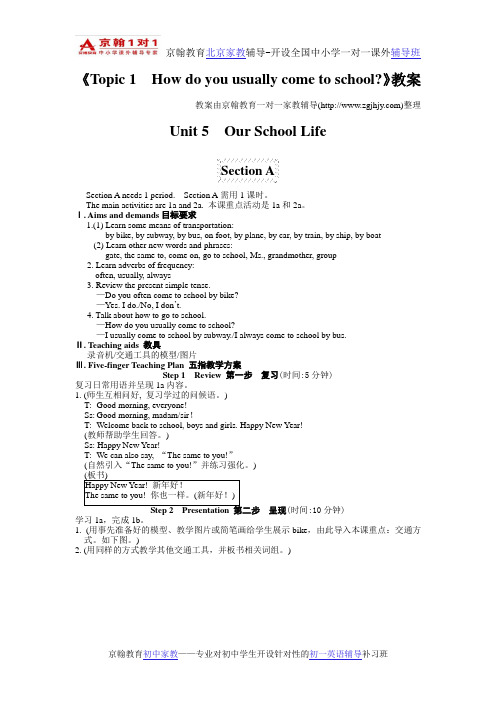
Ss: Yes, we do.
T: Good. Let’s begin! 2. (核对答案。) 3. (让学生听录音, 完成 2b。掌握生词 Ms.和 grandmother。)
T: Next, we will have a listening practice. Let’s find out how people come to school or come to
京翰教育北京家教辅导-开设全国中小学一对一课外辅导班
《Topic 1 How do you usually come to school?》教案
教案由京翰教育一对一家教辅导()整理
Unit 5 Our School Life
Section A
Section A needs 1 period. Section A 需用 1 课时。 The main activities are 1a and 2a. 本课重点活动是 1a 和 2a。 Ⅰ. Aims and demands 目标要求 1.(1) Learn some means of transportation:
- 1、下载文档前请自行甄别文档内容的完整性,平台不提供额外的编辑、内容补充、找答案等附加服务。
- 2、"仅部分预览"的文档,不可在线预览部分如存在完整性等问题,可反馈申请退款(可完整预览的文档不适用该条件!)。
- 3、如文档侵犯您的权益,请联系客服反馈,我们会尽快为您处理(人工客服工作时间:9:00-18:30)。
Unit 5 Our School Life
Topic 1 How do you usually come to school?
Section A
学习目标:
1、Remember new words.
2、Read the text and act out the dialog.
3、How to transform the traffic tools.
预习;
1、A:Happy New Year! B: .
2、Your bike (看起来)very nice!
3、How do you (通常)come to school?
4、I come to school (坐地铁).
5、It’s time(到上课的时间了).
教学流程:
自学指导
Step 1、Act out the dialog.
Step 2、英汉互译
1、新年快乐4、Come on!
2、坐地铁5、by train
3、坐船6、on foot
Step 3、用所给词的适当形式填空
1、I usually (come)to school by bus.
2、Jane usually (come)to school by bike.
3、Does Michael often (come)to school on foot?
4、Helen always (come)to school by subway.
5、Kangkang (go)to school on foot.
6、How does Jane usually (come)to school?
合作探究
1、Jane (go)to school (坐地铁).
2、Michael (come)home (坐公交).
3、Helen (go)home (步行).
4、Kangkang (go)shopping (骑自行车).
5、I (go)for a picnic (坐船)
展示提升
Step 1、Make a similar dialog as 1a.
Step 2、Act out the dialog group by group.
Step 3、The teacher corrects their mistakes if needed.
课堂小结:
1、我记住并能灵活运用的新单词
有。
2、我能够正确恰当地运用所学句型和短语,询问和回答乘坐什么交通工具去做
什么事情。
3、同学之间,师生之间及亲友之间要礼貌问候。
当堂检测,连接中考
Step 1:
1、I usually go to school (骑自行车).
2、A: do you often go to school?
B: By bus.
3、She (go)home by bike.
4、The students usually drive to the park on Sundays. But today they go to the park_____ .
A. on feet
B. on foot
C. by foot
D. on the foot
5、It’s time to.
A. breakfast
B. have breakfast
C. has breakfast
D. for breakfast
Step 2:英汉互译
1、on foot 6、回家
2、by ship 7、去上学
3、by plane 8、骑自行车
4、by car 9、加油!
5、by bus 10、新年好!。
